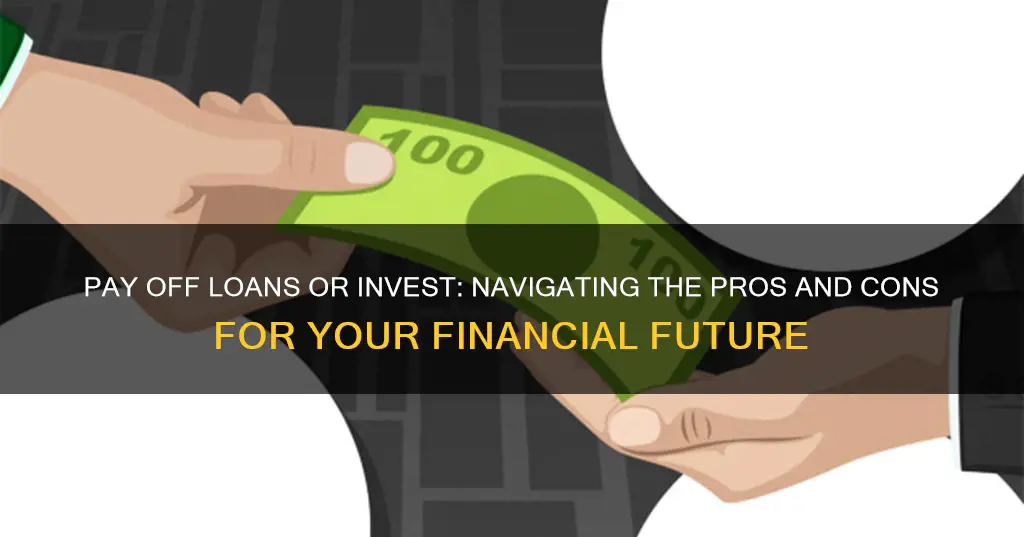
To pay off loans or to invest?
It's a tricky question, and the answer depends on your personal circumstances and financial goals. Here are some key factors to consider when deciding whether to pay off loans or invest:
- Budget: Start by evaluating your budget to understand your income, expenses, and how much extra cash you have available.
- Emergency Fund: Before paying off debt or investing, ensure you have a stash of money set aside for unexpected expenses, such as car repairs or medical bills.
- Retirement Plan: Review your company's retirement plan and take advantage of any matching contributions they offer, as this is essentially free money for your future.
- Interest Rates: Compare the interest rates on your debts with the potential returns on your investments. Focus on paying off high-interest debt, such as credit cards, first, as it can save you more money in the long run.
- Risk Tolerance: Investing in the stock market can provide higher returns, but it also comes with higher risk. Consider your risk tolerance and whether you're comfortable with the potential volatility of the market.
- Credit Score: Paying off debt, especially credit card debt, can improve your credit score, making it easier to borrow money in the future and potentially qualifying for lower interest rates.
- Peace of Mind: Being debt-free can provide peace of mind and reduce stress. If the weight of debt keeps you awake at night, there's nothing wrong with prioritising paying it off sooner.
| Characteristics | Values |
|---|---|
| Interest rates | Compare the interest rate on your debt with the return you expect to earn on your investments, and put the money toward the option with the higher percentage figure. |
| Emergency fund | Save an emergency fund before paying off debt or investing. |
| Retirement plan | Don't skip your company's retirement plan matches. |
| Credit card debt | Pay off high-interest credit card debt before investing. |
| Risk tolerance | If you are comfortable taking the gamble that your investments will bob up and down with the markets, then you are a better candidate for investing than someone who would lie awake at night worrying about what the market might do tomorrow. |
| Credit score | Having a low credit score can mean paying higher interest rates, if you can get a loan at all. |
| Peace of mind | If the weight of debt keeps you awake at night, there is nothing wrong with paying it down sooner. |
What You'll Learn

Weigh up the interest on your debts against the return on your investments
When deciding whether to pay off loans or invest, it's important to weigh up the interest on your debts against the potential return on your investments. This decision can be tricky and depends on several factors, including the interest rates on your debts, your financial situation, and your risk tolerance.
Firstly, it's crucial to assess the interest rates on your debts. If you have high-interest debt, such as credit card debt, which often has rates above 20%, it usually makes more financial sense to focus on paying off this debt aggressively rather than investing. By tackling high-interest debt first, you can save a significant amount in interest payments.
On the other hand, if you have low-interest debt, such as a mortgage or federal student loans with an interest rate below 6%, investing your money may be more advantageous. This is because the potential returns on your investments could exceed the interest you're paying on your debts. However, it's important to remember that investments can be volatile, and there is no guarantee that you will always earn a higher return than your debt's interest rate.
Another factor to consider is your financial situation. If you have extra cash and can afford to invest while still making the minimum payments on your debts, investing may be a good option. Additionally, if you have already built an emergency fund, taken advantage of any company retirement plan matches, and paid off any high-interest credit card debt, investing could be a wise choice.
Lastly, your risk tolerance plays a role in this decision. Investing in the stock market or other volatile assets may offer higher potential returns but comes with greater risk. If you are comfortable with taking on this risk and can handle the potential ups and downs of the market, investing may be suitable. However, if the idea of market volatility keeps you awake at night, you may prefer the guaranteed return of paying off your debts.
In summary, when deciding between paying off loans or investing, consider the interest rates on your debts, your financial situation, and your risk tolerance. Paying off high-interest debt is often a priority, while investing may be more advantageous for low-interest debt if you can afford it and are comfortable with the associated risks.
Blackberry Stock: Why the Hype?
You may want to see also

Assess your risk tolerance
When deciding whether to pay off loans or to invest, assessing your risk tolerance is a crucial step. Risk tolerance is the degree of risk that an investor is willing to take on, given the volatility in the value of an investment. It is influenced by factors such as age, investment goals, income, and future earning capacity.
- Age: Generally, younger investors are perceived to have a higher risk tolerance, as they have a longer time horizon for their investments to grow and can afford to take on more risk. However, it's important to note that age is not the sole determining factor, and individuals should consider their specific financial situation and goals.
- Investment goals: Understanding your investment goals is crucial in assessing your risk tolerance. If you are investing for a long-term goal, such as retirement, you may be willing to take on more risk to achieve potentially higher returns. Conversely, if you are saving for a short-term goal, you may prefer lower-risk investments to preserve your capital.
- Income and net worth: Your income and net worth play a significant role in determining your risk tolerance. Individuals with higher incomes and net worth can often afford to take on more risk, as they have more financial resources to absorb potential losses.
- Investment experience: Your level of investment experience can also influence your risk tolerance. If you are new to investing, you may want to start with a more cautious approach until you gain a better understanding of the market and your risk tolerance.
- Risk capacity: While risk tolerance measures your willingness to take on risk, risk capacity assesses your financial ability to take on risk. It's important to consider both aspects when making investment decisions.
To help assess your risk tolerance, you can utilise online risk tolerance assessments, which often include surveys or questionnaires. Additionally, reviewing historical returns for different asset classes can provide valuable insights into the volatility of various financial instruments.
Smart Ways to Invest $100,000
You may want to see also

Consider your credit score
When deciding whether to pay off loans or invest, it's important to consider your credit score and how your actions might affect it. Your credit score is a snapshot of your overall credit health, and it's influenced by several factors, including your credit history length, payment history, credit utilisation ratio, and the types of credit accounts you have.
- Payment history: Lenders will close your account once you pay off a loan, which can reduce the influence of your positive payment history on your credit score. On-time payments on open credit accounts carry more weight than a positive payment history on a closed account. However, your timely payments will remain on your credit report for 10 years, even after the account is closed.
- Credit utilisation ratio: A high credit utilisation ratio (over 50%) can negatively impact your credit score and make you appear riskier to creditors. It indicates that you're relying heavily on credit to make ends meet. Aim to keep your credit utilisation ratio below 30% by maintaining a good mix of different types of credit accounts.
- Length of credit history: Paying off a loan means that the specific account will no longer contribute to the length of your credit history. While the age of the closed account will still be considered, it won't continue to grow older with your open accounts.
- Data for scoring models: Once you pay off a loan, there won't be any new data points from that account for credit scoring models to use in their calculations. This can result in a temporary dip in your credit score. However, this impact is usually short-lived, and maintaining good credit habits is more crucial for building and maintaining a high credit score.
- Credit score impact: While paying off a loan early won't affect your credit score differently than paying it off on time, it can still influence your score positively or negatively, depending on your overall credit profile. A long credit history, timely payments, multiple instalment loans, and a good mix of credit accounts can help mitigate any potential negative impact.
Remember, your credit score is just one aspect to consider when deciding between paying off loans and investing. It's important to weigh this against other factors, such as interest rates, tax implications, and your financial goals and risk tolerance.
Tips: Invest or Avoid?
You may want to see also

Establish an emergency fund
Establishing an emergency fund is a crucial step in achieving financial security. Here are some detailed tips to help you build a solid emergency fund:
Start with a savings goal
Calculate your essential monthly expenses, such as rent, utilities, groceries, and insurance. Aim to save enough to cover these expenses for at least three to six months. This will provide a financial cushion in case of unexpected events like job loss, medical emergencies, or car repairs.
Create a budget
Analyse your income and spending habits to determine how much you can realistically set aside each month for your emergency fund. Track your income and expenses carefully to identify areas where you can cut back on non-essential spending.
Make saving a habit
Consistency is key. Set up automatic recurring transfers from your checking account to your savings account. Even small, regular contributions can add up over time. If you receive a tax refund or a cash gift, consider allocating a portion of it to your emergency fund.
Monitor your progress
Regularly check your savings balance to stay motivated and adjust your strategy as needed. There are various savings calculators and apps available to help you track your progress and reach your financial goals.
Stay disciplined
Resist the temptation to dip into your emergency fund for non-essential purchases. Remember, this fund is for unexpected expenses that could otherwise lead to high-interest debt. It's important to have a dedicated account for emergencies, so you're not tempted to spend it on non-essential items.
Prioritise high-interest debt
While building an emergency fund, focus on paying off any high-interest credit card debt first. Credit cards often have interest rates of around 20%, which can quickly outweigh the potential gains from investing. By tackling this debt, you'll save money and free up more cash for your emergency fund.
In summary, establishing an emergency fund is about consistency and discipline. By setting clear goals, creating a budget, and making saving a habit, you can build a solid financial cushion to protect yourself from unexpected expenses.
Retirement Planning: Invest More, Worry Less
You may want to see also

Prioritise paying off high-interest debt
If you're deciding whether to pay off loans or to invest, it's important to consider your debt amount, interest rates, and ability to stay on top of debt payments. If you're carrying high-interest credit card debt, it's often best to focus on wiping out the debt as quickly as possible, rather than investing.
- High interest rates: Credit cards can have interest rates as high as 30%, with an average of 20%. In 2022, credit card interest rates hit 19.04%, the highest since 1985. By tackling high-interest debt first, you can save hundreds or even thousands of dollars in interest payments.
- Financial stability: Carrying high-interest debt can be detrimental to your financial stability. Missing payments on loans and credit cards can harm your credit score, making it difficult to borrow money, rent an apartment, or open utility accounts. It also increases your credit utilisation ratio, which can make you appear risky to creditors.
- Peace of mind: Debt can be stressful, and there is nothing wrong with wanting to pay it down sooner. Paying off high-interest debt improves your financial security and gives you peace of mind.
- Credit score improvement: Lowering your debt can lead to an increase in your credit score, making it easier to access credit in the future.
- Reduced repayment time: Focusing on high-interest debt first can help you become debt-free faster. For example, the debt avalanche method involves paying off the highest-interest debt first while making minimum payments on other debts. This approach saves time and money by reducing the total interest paid over time.
In summary, prioritising the repayment of high-interest debt can provide significant financial benefits, improve your creditworthiness, and give you greater peace of mind.
Madoff Victims: A Global Reach
You may want to see also
Frequently asked questions
If you have a low mortgage rate, it may be more beneficial to invest your money instead of paying off your mortgage early. However, if you want guaranteed savings and the security of owning your home debt-free, paying off your mortgage earlier is a better option.
If you have high-interest student loans, it is generally recommended to pay them off first, as the interest charges are likely to be higher than what you would earn by investing. If your student loan interest rates are less than 6%, investing may be a better option as your investments could earn more in the long term.
Credit card debt tends to have high interest rates, so it is usually recommended to focus on clearing this debt before investing.







